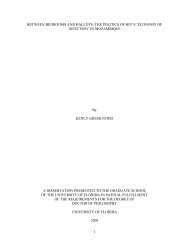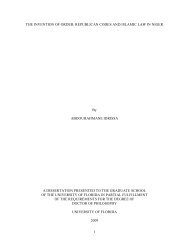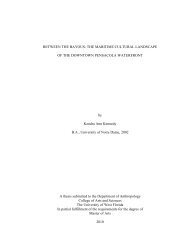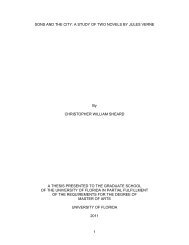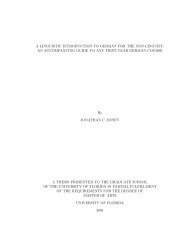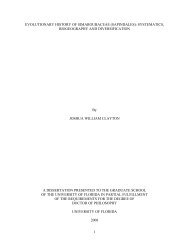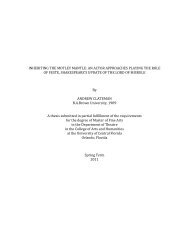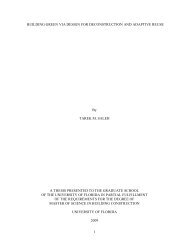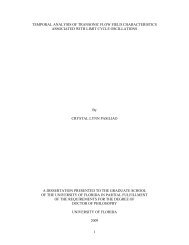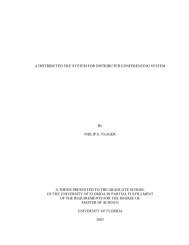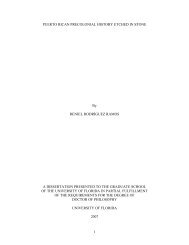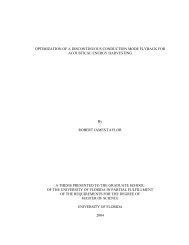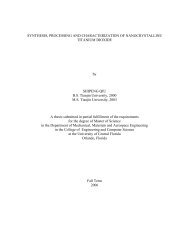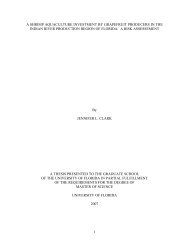- Page 1 and 2: PERSISTENCE OF THE LATIN ACCENT IN
- Page 3 and 4: To the memory of my parents, Manuel
- Page 5 and 6: TABLE OF CONTENTS ACKNOWLEDGMENTS .
- Page 7 and 8: Four-syllable Nouns................
- Page 9 and 10: 3-5 Vulgar Latin constraints on acc
- Page 11 and 12: 4-31 Possible heavy/light syllable
- Page 13 and 14: 5-22 Distribution of heavy/light sy
- Page 15 and 16: 2-3 Iambic shortening..............
- Page 17 and 18: 5-13 Relative frequency of 3-syllab
- Page 19 and 20: 6-9 Outcomes of disyllablic nouns w
- Page 21 and 22: etween primary accent and the segme
- Page 23 and 24: of those constraints in the three m
- Page 25 and 26: B “this perfect correlation canno
- Page 27: The vowel labeled [+stress] in Figu
- Page 31 and 32: monosyllable. Therefore, it is mark
- Page 33 and 34: specific rules. In the Halle/Vergna
- Page 35 and 36: ut of those pieces of a syllable th
- Page 37 and 38: and a period indicates non-head ele
- Page 39 and 40: With regard to extension, bounded s
- Page 41 and 42: patterns B and C; these correspond
- Page 43 and 44: In order to achieve the binary patt
- Page 45 and 46: output.” The assessment of output
- Page 47 and 48: constraints in recognizing universa
- Page 49 and 50: glides liquids nasals voiced voicel
- Page 51 and 52: It can be seen from Table 1-4 that
- Page 53 and 54: discussion). Additionally, initial
- Page 55 and 56: Both MAX and DEP have consequences
- Page 57 and 58: is the case of syllabic nasals and
- Page 59 and 60: Jacobs 1999, 384). Examples of fina
- Page 61 and 62: Gradient constraints (Hayes 2000, B
- Page 63 and 64: DEPI/O and ROOT-IDENT. However, if
- Page 65 and 66: antepenultimate accent was once con
- Page 67 and 68: structure, such as constraints on c
- Page 69 and 70: co-occurrence of both pitch and str
- Page 71 and 72: 2-2 the first line shows the poetic
- Page 73 and 74: poetry and song is well known in ma
- Page 75 and 76: Table 2-3. Early Latin syncope 1. L
- Page 77 and 78: The OT derivation of pre-classical
- Page 79 and 80:
2-5 the results of the new constrai
- Page 81 and 82:
Iambic Shortening and Cretic Shorte
- Page 83 and 84:
eproduced in Table 2-6, are all two
- Page 85 and 86:
there are two underlying, inviolabl
- Page 87 and 88:
(nom. sg.), capitis (gen. sg.). Not
- Page 89 and 90:
celiandre. However, Portuguese coen
- Page 91 and 92:
lengthening to devlop in a language
- Page 93 and 94:
‘sorrowful.’ Allen (1973, 137)
- Page 95 and 96:
means that not all elements on the
- Page 97 and 98:
(2.16) H/R: Align the head foot to
- Page 99 and 100:
more successful in learning primary
- Page 101 and 102:
CHAPTER 3 FROM QUANTITY SENSITIVE T
- Page 103 and 104:
terminology, it is also characteriz
- Page 105 and 106:
Clusters of the type liquid + stop
- Page 107 and 108:
one most propitious for syncope, th
- Page 109 and 110:
How syncope actually affects the as
- Page 111 and 112:
complex codas for Catalan and coda
- Page 113 and 114:
ca(pi.clum,), (ar)(ti.clus), (ver)(
- Page 115 and 116:
Jacobs’s suggestion of syncope as
- Page 117 and 118:
espectively 5 (The other languages
- Page 119 and 120:
When the difference is computed as
- Page 121 and 122:
città to project two moras to sati
- Page 123 and 124:
frequency of occurrence. The invent
- Page 125 and 126:
Port. olho; from -g’l-, as in VL
- Page 127 and 128:
number of the left corresponds to A
- Page 129 and 130:
Apocope Apocope is further evidence
- Page 131 and 132:
141 faseolus non fassiolus. Cat. fe
- Page 133 and 134:
The authors of the study on Catalan
- Page 135 and 136:
(3.6) MAX-IO-V[lo]: If an input V s
- Page 137 and 138:
Table 3-16. Latin words of 2 to 5 s
- Page 139 and 140:
CHAPTER 4 ACCENTUAL PATTERNS IN THE
- Page 141 and 142:
preference for heavy syllables in p
- Page 143 and 144:
Sihler (1995, 266-269) notes that t
- Page 145 and 146:
to pre-tonic and post-tonic vowels
- Page 147 and 148:
appear in shaded cells. Results are
- Page 149 and 150:
the resolution of complex internal
- Page 151 and 152:
to at least one syllable except for
- Page 153 and 154:
In the case of Latin two-syllable w
- Page 155 and 156:
Table 4-5. Contingency table for H/
- Page 157 and 158:
Lat. tructa, ae, f. ‘trout’ 14
- Page 159 and 160:
fronting of preceding vowel, Portug
- Page 161 and 162:
stages of Catalan, for example, Old
- Page 163 and 164:
232 disyllabic first declension Lat
- Page 165 and 166:
HC A) Penultimate Accent HV L B) An
- Page 167 and 168:
Table 4-12. Contingency table for H
- Page 169 and 170:
The new prosodic template that has
- Page 171 and 172:
construct a foot to the left of the
- Page 173 and 174:
higher degree of prominence because
- Page 175 and 176:
Table 4-16. Tableau for output of f
- Page 177 and 178:
100.0% 80.0% 60.0% 40.0% 20.0% 0.0%
- Page 179 and 180:
eina, rainha (cf. Lloyd 1987, 320);
- Page 181 and 182:
provides a pronunciation of [pə'ri
- Page 183 and 184:
Table 4-21. Tableau for selection o
- Page 185 and 186:
STW (A stressed syllable is bimorai
- Page 187 and 188:
suggested that such words may never
- Page 189 and 190:
stressed syllable is bimoraic). Mai
- Page 191 and 192:
The difference in distribution of h
- Page 193 and 194:
100.00% 80.00% 60.00% 40.00% 20.00%
- Page 195 and 196:
heavy; the same situation holds for
- Page 197 and 198:
L.L.L1.L. The primary cause of loss
- Page 199 and 200:
epresentation of a segment in stand
- Page 201 and 202:
violations specific to their langua
- Page 203 and 204:
In the input forms in Table 4-37 th
- Page 205 and 206:
Combining the results of both group
- Page 207 and 208:
‘corner of one’s mouth’ is pr
- Page 209 and 210:
Veinte presas H L L H hemos hecho L
- Page 211 and 212:
In terms of syllabic loss, the L.L.
- Page 213 and 214:
78 cases represented in the data se
- Page 215 and 216:
pronounced [əmέʎʎə] and [am
- Page 217 and 218:
Catalan (peripheral areas of Centra
- Page 219 and 220:
penultimate accent, for example, Ch
- Page 221 and 222:
coincide with a morpheme or prefix.
- Page 223 and 224:
For the languages in question, then
- Page 225 and 226:
morpheme. The second pattern with i
- Page 227 and 228:
Because the five-syllable words are
- Page 229 and 230:
Surprisingly, Portuguese shows the
- Page 231 and 232:
unaccented syllable. It is always m
- Page 233 and 234:
CHAPTER FIVE VOWEL LOSS AND THE RIS
- Page 235 and 236:
this declension class and feminine
- Page 237 and 238:
some cases. The constraints that pr
- Page 239 and 240:
high percentage of cases in both Ca
- Page 241 and 242:
(5.2) MAX SEGMENT INPUT-OUTPUT (abb
- Page 243 and 244:
315) employs the concept of the dem
- Page 245 and 246:
glide accounts for the somewhat low
- Page 247 and 248:
The effect of demotion of MAX V is
- Page 249 and 250:
The locus of primary accent is pred
- Page 251 and 252:
nominative and accusative (Gran dic
- Page 253 and 254:
108). The final consonant of the CC
- Page 255 and 256:
Catalan peu ( Port. exame. As in Ta
- Page 257 and 258:
100.0% 80.0% 60.0% 40.0% 20.0% 0.0%
- Page 259 and 260:
Three-syllable Nouns The outcomes o
- Page 261 and 262:
For example, in most varieties of C
- Page 263 and 264:
80.0% 70.0% 60.0% 50.0% 40.0% 30.0%
- Page 265 and 266:
to-Head) constraint calls for a hea
- Page 267 and 268:
coda-less tonic syllable in aspecto
- Page 269 and 270:
20 15 10 5 0 H L H L H L H L S3 S2
- Page 271 and 272:
(C)V.'CVC2.C1V → (C)V.'CVC1. Loss
- Page 273 and 274:
irmão ‘brother’ (< germānus,
- Page 275 and 276:
preference for the two-syllable tem
- Page 277 and 278:
and HV syllables are combined. Agai
- Page 279 and 280:
-ón and Por. -ão, outcomes of Lat
- Page 281 and 282:
100.0% ➊ ➋ ➌ 80.0% 60.0% 40.0
- Page 283 and 284:
the HV type syllable in Ibero-Roman
- Page 285 and 286:
NOCODACAT, CAS, POR or SONSEQ (in t
- Page 287 and 288:
24 20 16 12 8 4 CAT ➊ ➋ 0 H.H.'
- Page 289 and 290:
coda position may not be identical
- Page 291 and 292:
uniformity in the nature of the fir
- Page 293 and 294:
an uneven trochee due to its decrea
- Page 295 and 296:
not belong to a learned register wh
- Page 297 and 298:
The nine cases of ultimate accent i
- Page 299 and 300:
100 80 60 40 20 0 L.L.'L.L ➊ ➎
- Page 301 and 302:
that the proposed parsing, L('H), i
- Page 303 and 304:
frequent L('H.L.L) (data points 1 a
- Page 305 and 306:
learned or semi-learned in nature,
- Page 307 and 308:
24 20 16 12 ➌ ➍ 8 ➊ 4 ➋ ➎
- Page 309 and 310:
60 50 40 30 20 10 0 ➋ ➊ ➌ ,H.
- Page 311 and 312:
Classical Latin it is treated here
- Page 313 and 314:
Table 5-22. Distribution of heavy/l
- Page 315 and 316:
There are few cases of reduction to
- Page 317 and 318:
5-35 have a unifying factor, a syll
- Page 319 and 320:
eduction strategies seen here, apoc
- Page 321 and 322:
5-38, 5-39, 5-40) is a four-syllabl
- Page 323 and 324:
CHAPTER SIX PREFERRED PROSODIC TEMP
- Page 325 and 326:
Level 2: Assign * to the head foot
- Page 327 and 328:
for continuation of a heavy initial
- Page 329 and 330:
The set of five-syllable nouns with
- Page 331 and 332:
Patterns with Antepenultimate Accen
- Page 333 and 334:
that coincide in the three language
- Page 335 and 336:
deletion of a pretonic vowel. Thus,
- Page 337 and 338:
were disyllabic, then the two most
- Page 339 and 340:
locus of accent for Catalan. This i
- Page 341 and 342:
verb system as well where verbs of
- Page 343 and 344:
positions of non-prominence and rig
- Page 345 and 346:
(6.9) Max/front: A vowel in the inp
- Page 347 and 348:
250 200 150 100 ➍ 50 0 -50 '
- Page 349 and 350:
displacement of accent to the penul
- Page 351 and 352:
liebre, Port. lebre (
- Page 353 and 354:
Table 6-8. Continued 'L.H L.'H H.'H
- Page 355 and 356:
350 300 250 200 150 100 50 0 CAT CA
- Page 357 and 358:
While perhaps not representative of
- Page 359 and 360:
180 160 140 120 100 80 60 40 20 0 C
- Page 361 and 362:
input to this preferred template co
- Page 363 and 364:
Table 6-13. Distribution and origin
- Page 365 and 366:
een shown here that the datasets of
- Page 367 and 368:
APPENDIX A APPENDIX PROBI Väänän
- Page 369 and 370:
172 anus non anucla. 173 tondeo non
- Page 371 and 372:
x Row 2: End Rule (Final, Word) wea
- Page 373 and 374:
monstro [mõʃtɾu] and Cat. monstr
- Page 375 and 376:
D → F F Each dipode consists of t
- Page 377 and 378:
stress-based poetic verse emerges a
- Page 379 and 380:
utilize Latin. However, Wright (198
- Page 381 and 382:
of bearing an accent. Therefore, fu
- Page 383 and 384:
383 Etymon Dcl σ Ac Temp Gen CAT
- Page 385 and 386:
385 Etymon Dcl σ Ac Temp Gen CAT
- Page 387 and 388:
387 Etymon Dcl σ Ac Temp Gen CAT
- Page 389 and 390:
389 Etymon Dcl σ Ac Temp Gen CAT
- Page 391 and 392:
391 Etymon Dcl σ Ac Temp Gen CAT
- Page 393 and 394:
393 Etymon Dcl σ Ac Temp Gen CAT
- Page 395 and 396:
395 Etymon Dcl σ Ac Temp Gen CAT
- Page 397 and 398:
397 Etymon HV.HC1.X (14) Dcl σ Ac
- Page 399 and 400:
399 Etymon Dcl σ Ac Temp Gen CAT
- Page 401 and 402:
401 Etymon Dcl σ Ac Temp Gen CAT
- Page 403 and 404:
403 Etymon Dcl σ Ac Temp Gen CAT
- Page 405 and 406:
405 Etymon HV1.L.X (1) Dcl σ Ac Te
- Page 407 and 408:
407 Etymon Dcl σ Ac Temp Gen CAT
- Page 409 and 410:
409 Etymon Dcl σ Ac Temp Gen CAT
- Page 411 and 412:
411 Etymon HC.HC1.X (1) Dcl σ Ac T
- Page 413 and 414:
413 Etymon Dcl σ Ac Temp Gen CAT
- Page 415 and 416:
415 Etymon Dcl σ Ac Temp Gen CAT
- Page 417 and 418:
417 Etymon Dcl σ Ac Temp Gen CAT
- Page 419 and 420:
419 Etymon HV1.L.X (1) Dcl σ Ac Te
- Page 421 and 422:
421 Etymon Dcl σ Ac Temp Gen CAT
- Page 423 and 424:
423 Etymon Dcl σ Ac Temp Gen CAT
- Page 425 and 426:
425 Etymon Dcl σ Ac Temp Gen CAT
- Page 427 and 428:
427 Etymon Dcl σ Ac Temp Gen CAT
- Page 429 and 430:
429 Etymon Dcl σ Ac Temp Gen CAT
- Page 431 and 432:
431 Etymon Dcl σ Ac Temp Gen CAT
- Page 433 and 434:
433 Etymon HC.HC1.X (1) Dcl σ Ac T
- Page 435 and 436:
435 Etymon Dcl σ Ac Temp Gen CAT
- Page 437 and 438:
437 Etymon Dcl σ Ac Temp Gen CAT
- Page 439 and 440:
439 Etymon HC.HC1.X (2) Dcl σ Ac T
- Page 441 and 442:
441 Etymon Dcl σ Ac Temp Gen CAT
- Page 443 and 444:
443 Etymon L.HC1.X (14) Dcl σ Ac T
- Page 445 and 446:
445 Etymon Dcl σ Ac Temp Gen CAT
- Page 447 and 448:
447 Etymon Dcl σ Ac Temp Gen CAT
- Page 449 and 450:
449 Etymon Dcl σ Ac Temp Gen CAT
- Page 451 and 452:
451 Etymon L.HC1.X (18) Dcl σ Ac T
- Page 453 and 454:
453 Etymon Dcl σ Ac Temp Gen CAT
- Page 455 and 456:
455 Etymon Dcl σ Ac Temp Gen CAT
- Page 457 and 458:
457 Etymon L1.L.X (1) Dcl σ Ac Tem
- Page 459 and 460:
459 Etymon L.HC1.X (1) Dcl σ Ac Te
- Page 461 and 462:
461 Etymon Dcl σ Ac Temp Gen CAT
- Page 463 and 464:
463 Etymon Dcl σ Ac Temp Gen CAT
- Page 465 and 466:
465 Etymon Dcl σ Ac Temp Gen CAT
- Page 467 and 468:
467 Etymon L1.L.X (2) Dcl σ Ac Tem
- Page 469 and 470:
469 Etymon Dcl σ Ac Temp Gen CAT
- Page 471 and 472:
471 Etymon Dcl σ Ac Temp Gen CAT
- Page 473 and 474:
473 Etymon Dcl σ Ac Temp Gen CAT
- Page 475 and 476:
475 Etymon HV1.L (43) Dcl σ Ac Tem
- Page 477 and 478:
477 Etymon Dcl σ Ac Temp Gen CAT
- Page 479 and 480:
479 Etymon Dcl σ Ac Temp Gen CAT
- Page 481 and 482:
481 Etymon Dcl σ Ac Temp Gen CAT
- Page 483 and 484:
483 Etymon Dcl σ Ac Temp Gen CAT
- Page 485 and 486:
485 Etymon Dcl σ Ac Temp Gen CAT
- Page 487 and 488:
487 Etymon Dcl σ Ac Temp Gen CAT
- Page 489 and 490:
489 Etymon Dcl σ Ac Temp Gen CAT
- Page 491 and 492:
491 Etymon Dcl σ Ac Temp Gen CAT
- Page 493 and 494:
493 Etymon Dcl σ Ac Temp Gen CAT
- Page 495 and 496:
495 Etymon Dcl σ Ac Temp Gen CAT
- Page 497 and 498:
497 Etymon Dcl σ Ac Temp Gen CAT
- Page 499 and 500:
499 Etymon Dcl σ Ac Temp Gen CAT
- Page 501 and 502:
501 Etymon Dcl σ Ac Temp Gen CAT
- Page 503 and 504:
LIST OF REFERENCES Abaurre, Maria B
- Page 505 and 506:
Bonet, Eulàlia, and Joan Mascaró.
- Page 507 and 508:
Davies, Mark. (2002-2004). Corpus d
- Page 509 and 510:
———. 2004. Positional weight
- Page 511 and 512:
Hulst, Harry van der, Bernadet Hend
- Page 513 and 514:
Lloyd, Paul M. 1987. Historical pho
- Page 515 and 516:
———. 2000. Variation and chan
- Page 517 and 518:
Saltarelli, Mario. 2003. A constrai
- Page 519 and 520:
Yip, Moira. 1991. Coronals, consona



